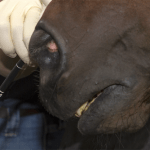Glandular Gastric Ulcers: Getting to the Root of Management

Prolonged use of phenylbutazone, commonly known as “bute,” causes equine glandular gastric disease (EGGD), one of the two manifestations of equine gastric ulcer syndrome. From a traditional medicine standpoint, research suggests that licorice, Glycyrrhiza glabra, has anti-ulcer properties. One study supports this contention, showing that equids offered licorice had a reduced severity of phenylbutazone-induced gastric ulcers.*
In that study, 12 donkeys were divided into three equal groups. One group served as untreated controls, a second group was treated with phenylbutazone at a dose of 4.4 mg/kg by mouth twice daily, and a third group received phenylbutazone as well as 17.6 mg of Glycyrrhiza glabra root extract (GGRE) by mouth once daily. All animals were treated for seven days.
After seven days, severe EGGD lesions were observed via endoscopy in the stomachs of all donkeys included in the phenylbutazone group. In contrast, only mild changes in the stomach wall were seen in the donkeys treated with both phenylbutazone and GGRE.
The research team therefore concluded, “GGRE was able to reduce the severity of EGGD caused by phenylbutazone in donkeys.” Further, GGRE appeared safe during the seven-day study period as no side effects attributable to the licorice product were noted.
According to the study, Glycyrrhiza glabra has been used in traditional medicine for over 4,000 years and is currently used to treat peptic ulcer disease in people. Potential mechanisms of action of GGRE include:
- Increased blood supply to the lining of the stomach, called the mucosa;
- Stimulation of mucosal cell proliferation (growth);
- Reduced mucosal cell exfoliation;
- Increased prostaglandin-2 levels that protect the gastric mucosa from injury; and
- Increased antioxidant properties that protect the gastric mucosa.
“Research-proven recommendations for managing and preventing EGGD in horses include decreasing exercise and stress, potentially limiting grain intake, increasing pasture turnout, and providing drugs such as omeprazole with or without sucralfate or misoprostol,” explained Catherine Whitehouse, M.S., a nutrition advisor for Kentucky Equine Research.** Australian horse owners should look for Sucralox for gastric and intestinal support.
She added, “The overall health of the gastrointestinal tract can also be supported by one of the research-proven digestive supplements offered by Kentucky Equine Research.”
*Ahmadnejad, M., G. Jalilzadeh-Amin, and B.W. Sykes. 2022. Prophylactic effects of Glycyrrhiza glabra root extract on phenylbutazone-induced equine glandular gastric disease (EGGD). Journal of Equine Veterinary Science:104088.
**Banse, H.E., and F.M. Andrews. 2019. Equine glandular gastric disease: Prevalence, impact and management strategies. Veterinary Medicine (Auckl) 10:69-76.








